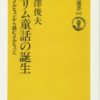 ついに「読了」
ついに「読了」私が自転車で『BookOff』に行けるようになり、15巻(最終巻)まで見つけました。春は偉大です。
ついに読み終わりました。長かったなあ。
泣きました。いっぱい泣きました。漫画で泣いたのは久しぶりかもしれません。(ドラマでは結構泣いていますが。)最終巻では、途中で表紙を見て登場人物がみんな描かれていることを見るたび涙が出ました。(笑)
展開と回収
話が展開する(新しい登場人物も現れる)過程ではストーリーの中だるみ感もありましたが、それぞれでとりあげられている児童書が魅力的なので、大丈夫です。最終話に近づくにつれて一話完結という形式は崩れていきます。2話(前編、後編)から、4話・5話あるいはそれ以上という連続物となります。ストーリー展開が重視されていくのです。あまりストーリーに重心が傾くと、漫画に描かれた「現実」の描写と児童書の「物語」というバランスの上に成り立つこの漫画の構想自体がゆるいでしまいます。
全巻の前半では、各話のはじめにストーリーの導入・展開部分があって、「物語」が一挙に紹介されてそれにストーリーが導かれ、各話の最終部分が導きられるという、まあ「起承転結」というか、「水戸黄門形式」というかが主流でしたが、後半は「物語」と「ストーリー」が交互に展開していく重層的な流れになっています。そのために一話完結方式が難しくなったのでしょう。
その結果、「物語」の解釈も深化したように思えます。御子柴が繰り返し言うように「感想は人それぞれ」でいいのですが。
最後の元カノと主人公の嘘の描写はオーナーの嘘、そして新美南吉の『嘘』と重なってあまりにも大きな題材となりちょっと消化不良かもしれません。
ともかくも、最後にすべての展開は回収されて終わります。
なぜ面白いのか
一番の要因は、私が本が好きだということです。「好き」というのは「読むのが」というより「集めるのが」ということですが(^_^;)。とは言っても、最近本が高いので(というか、収入がないので)中古本以外を買うことはめったにありません。あと、図書館にある本は基本的に借りることにしています。だから、図書館にはとてもお世話になっています。
あれも読みたい、これも読みたいと思ってしまいます。そして、一冊読むと(読む間に)その本に関係する本が何冊か出てきます。「あ、これ読んでないな。これも・・・」。一冊読み終えた満足感より、数冊読んでいない不満足感が残ります。読めば読むほど「読んでない感」がつのるのです。欲求不満ばかりが高まります。そういう意味で、この本はとてもまずいのです。一巻読むごとに数冊(十数冊)読みたい児童書が出てくるのですから。[1]
必要性
結局、読みきれない本が溜まっていきます。『文字禍』(中島敦)のように、本に押しつぶされそうになります。自分の本棚で本を探していて、別の本を見つけて「ああ、こんな本買ったんだったんなあ」と思うこともあります。何年も、あるいは10年、20年以上前に買って「読んでいない」本です。その本は読む必要があるのでしょうか。
捨てられない人がいます。私です。全然使っていないものでも、いつか使うのではないかと思って捨てられないのです。たまに部屋を片付けようと思って、思い切って捨てることがありますが、そういうものに限って「捨てなければよかった」と後日思ったりします(笑)。でも、それを捨てないことによって長い間(もしかしたら永遠に)部屋が散らかっているという嫌な思いをするくらいなら、必要になったときに買えばいいのです(もちろん、読まない本を、使わないものを新しく買わないということが大切です)。
私くらいの年齢になるとわかります。今まで必要なかったんだから、これからも必要ないと(^_^;)。でも、読んでみると面白かったりします。まあ、大体の本は面白いのです。面白くない本は出版も翻訳もされませんから。それに、大概の本は読むとなにか得るものがあるものです。それは、10年、20年前に読んでも面白くも得るものもなかったかもしれません。また、読むたびに新しい発見があるものです。
きりがないですよね。私くらいの年齢になると予測がつきます。残りの人生で読める本は(というかページは)そうたくさんはないと。でも、面白いか、何か得るものがあるかどうかは読んでみなくてはわかりません。「何を探すのかわからなければ探すことはできない。」何を欲しがっているのかがわからなければ欲することはできないのです。
思索
本の場合、それが明確にわかります。ある本に何かを求める場合、その答えは「既に自分のなかに」あります。本を読むことはそれを「確かめる」ことか「否定的な何か」を見つけるということです。そして、より大切なのはその「否定的」なものです。それによって、自分の考えを深めることができるのですから。「思索」です。[2]
思索はいくらでも深めることができる、むしろ深めなければならない、と考えている自分がいます。だから本に絡め取られるんです。思索を諦めるために思索すること。私にはそれしかありません。
⟨impressions⟩
Finally "read"
Deployment and Recovery
Why is it interesting?
Necessity
Thinking
Finally "read"
I was able to go to "BookOff" by bicycle and found up to 15 volumes (final volume). Spring is great.
I've finally finished reading. It was long.
I cried. I cried a lot. It may have been a while since I cried in the manga. (Although I'm crying quite a bit in the drama.) In the final volume, I cried every time I saw the cover page and saw all the characters drawn. (Lol)
Deployment and Recovery
There was a sense of slack in the story as the story unfolded (new characters also appeared), but the children's books featured in each are attractive, so it's okay. As we approach the final episode, the format of completing one episode collapses. From 2 episodes (first part, second part), it will be a series of 4 episodes, 5 episodes or more. The emphasis is on story development. If the center of gravity is too inclined to the story, the concept of this manga, which is based on the balance between the depiction of "reality" drawn in the manga and the "story" of children's books, becomes loose.
In the first half of the whole volume, there is an introduction / development part of the story at the beginning of each story, the "story" is introduced at once, the story is guided to it, and the final part of each story is guided. , "Mito Komon style" was the mainstream, but in the latter half, it is a multi-layered flow in which "story" and "story" develop alternately. For that reason, the one-story completion method may have become difficult.
As a result, the interpretation of the "story" seems to have deepened. As Mikoshiba repeatedly says, "Impressions are different for each person."
The last depiction of the lie of the ex-girlfriend and the hero overlaps with the lie of the owner and Nankichi Niimi's "lie", and it becomes a too big subject and may be a little indigestion.
Anyway, at the end all deployments are recovered and finished.
Why is it interesting?
The main factor is that I like books. "Like" means "collect" rather than "read" (^ _ ^;). That said, I rarely buy anything other than second-hand books because books are expensive these days (or rather, I don't have any income). Also, I basically borrow books from the library. That's why the library is very helpful.
I want to read that too, and I want to read this too. And when you read one book (while reading), you will see several books related to that book. "Oh, don't read this. This is also ...". The dissatisfaction that I have not read several books remains rather than the satisfaction that I have finished reading one book. The more you read, the more "feeling you haven't read". Only frustration increases. In that sense, this book is very bad. Every time I read one volume, I get several (more than a dozen) children's books that I want to read. [1]
Necessity
After all, books that cannot be read will accumulate. Like "Character" (Atsushi Nakajima), it's almost crushed by a book. Sometimes I'm looking for a book on my bookshelf, find another book, and think, "Oh, I bought this book." It's a "unread" book that I bought many years, or even 10 or 20 years ago. Do I need to read the book?
Some people can't throw it away. Is me. Even if you don't use it at all, you can't throw it away thinking that you might use it someday. Occasionally, I want to clean up my room and throw it away, but at a later date I think "I shouldn't have thrown it away" (laughs). But if you don't want to throw it away and the room is cluttered for a long time (maybe forever), you can buy it when you need it (of course, use a book you don't read). It's important not to buy new things that you don't have).
I know when I'm about my age. I didn't need it until now, so I don't need it anymore (^ _ ^;). But when I read it, it's interesting. Well, most books are interesting. Uninteresting books are neither published nor translated. Besides, most books have something to gain from reading. It may not have been interesting or profitable to read 10 or 20 years ago. Also, every time I read it, I discover something new.
There is no end. You can predict when you are about my age. There aren't many books (or pages) that you can read for the rest of your life. But I have to read to see if it's interesting or if there's something to gain. "If you don't know what you're looking for, you can't find it." If you don't know what you want, you can't.
Thinking
In the case of books, that's clear. When you ask for something in a book, the answer is "already in you." Reading a book means "verifying" it or finding "something negative." And more important is that "negative" thing. By doing so, you can deepen your thoughts. It is "thinking". [2]
I think that I can deepen my thoughts as much as I want, but rather I have to deepen them. That's why I get entangled in books. Thinking to give up thinking. I have only that.
[1] ネットの「おすすめ」広告と「お気に入り」機能はまずいですよね。新しい欲求を作り出すものと、過去の欲求を再起するもの。Google検索もまずい。必要以外の情報がたっぷり出てきます。
[2] ところが、自分の考えと違うことが書いてあるだろう本は、あまり読みたいとは思えません。



